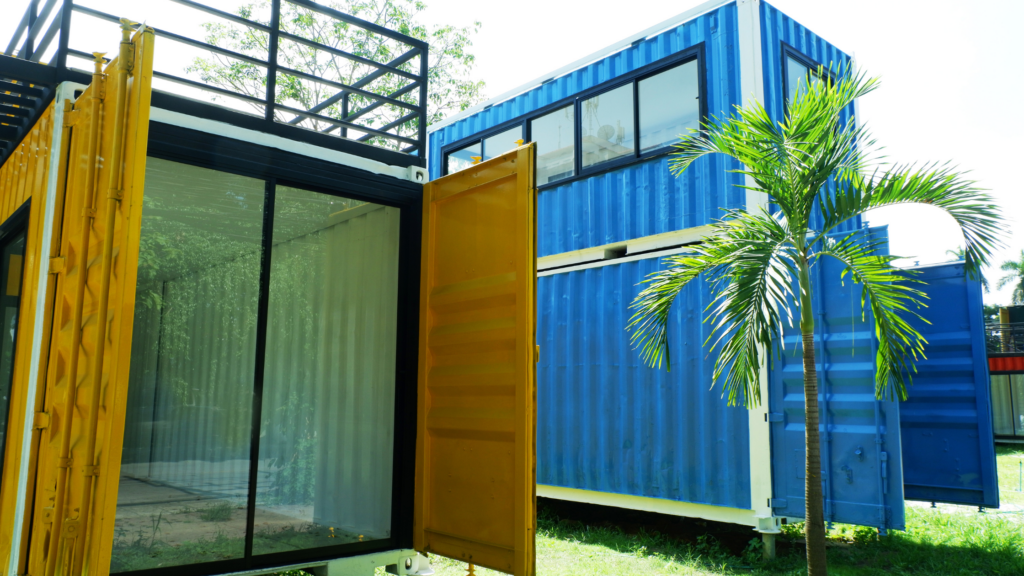The Rise of Modular Buildings in Construction

A Shift In The Construction Industry
In recent years, the construction industry has witnessed a significant shift towards modular buildings. These prefabricated structures offer numerous advantages over traditional construction methods, driving their popularity across various sectors. This article delves into the rise of modular buildings, examining their benefits, applications, and impact on the construction industry. Although Jennings Containers does not supply modular buildings, we support many businesses with high-quality shipping container purchases and hires.
What Are Modular Buildings?
Definition and Components
Modular buildings are prefabricated structures composed of repeated sections called modules. These modules are manufactured in a factory setting and then transported to the construction site, where they are assembled to form a complete building. This method contrasts with traditional construction, which involves building each part of the structure on-site.
Types of Buildings
Modular buildings can be either permanent or temporary. Permanent modular buildings are designed for long-term use and are indistinguishable from traditionally constructed buildings. Temporary buildings, on the other hand, are often used for short-term applications such as site offices, classrooms, or event spaces and can be easily relocated as needed.
Benefits of Modular Buildings
Speed of Construction
One of the most significant advantages of modular buildings is the speed of construction. Since modules are manufactured in a controlled factory environment, the construction process is not subject to weather delays or site-related issues. This efficiency can reduce construction time by up to 50%, enabling faster project completion and earlier occupancy.
Cost-Effectiveness
Modular buildings can be more cost-effective than traditional construction methods. Factory production allows for economies of scale, reducing material waste and labour costs. Additionally, the accelerated construction timeline can lead to lower financing costs and quicker returns on investment.
Quality Control
The controlled environment of a factory setting ensures higher quality control standards. Each module undergoes rigorous inspection and testing before leaving the factory, resulting in a consistently high-quality product. This level of precision is challenging to achieve with on-site construction.
Sustainability
Modular buildings are inherently more sustainable due to reduced waste and energy consumption during the construction process. Factories can recycle materials more efficiently, and the shorter construction timeline reduces the environmental impact. Additionally, many buildings are designed with energy-efficient features, further enhancing their sustainability credentials.
Applications of Modular Buildings
Residential
The residential sector has embraced modular buildings for various applications, including single-family homes, multi-family housing, and student accommodations. Modular construction’s speed and cost-effectiveness make it an attractive option for addressing housing shortages and delivering high-quality, affordable homes.
Commercial
In the commercial sector, modular buildings are used for offices, retail spaces, and hospitality establishments. Businesses benefit from the rapid construction and minimal disruption to their operations, allowing them to open new locations or expand existing ones quickly.
Educational
Modular buildings provide a flexible solution for educational institutions needing additional classroom space. Schools and universities can rapidly deploy modular classrooms to accommodate growing student populations or temporary needs, such as during renovations or emergencies.
Healthcare
The healthcare industry has adopted buildings for hospitals, clinics, and temporary medical facilities. The ability to construct and deploy these buildings quickly is crucial for responding to healthcare demands, such as during a pandemic or in underserved areas.
Industrial
Modular buildings are also used in the industrial sector for applications such as site offices, control rooms, and worker accommodations. Their durability and ease of relocation make them ideal for remote or changing job sites.
Impact on the Construction Industry
Changing Perceptions
Modular buildings were once viewed as inferior to traditional construction, often associated with temporary or low-quality structures. However, advances in technology and design have shifted perceptions, and modular buildings are now recognised for their quality, efficiency, and versatility.
Technological Integration
The rise of modular buildings has driven innovation in construction technology. Building Information Modelling (BIM) and other digital tools are increasingly used to design and manage modular construction projects, enhancing precision and collaboration across the industry.
Workforce Implications
The growth of modular construction has implications for the construction workforce. While it reduces the need for on-site labour, it increases demand for skilled workers in manufacturing and assembly. This shift requires training and adaptation within the industry to ensure a smooth transition.
These Articles May Also Interest You:
10 things you can do with a 10ft Container
Unlocking the Potential of 6ft Containers: A Compact Solution for Your Space Dilemmas!
Your Ultimate Guide to Container Hire Storage Solutions
Purchase Shipping Containers for Modular Buildings with Jennings Containers
The rise of modular buildings represents a significant evolution in the construction industry. Their speed, cost-effectiveness, quality control, and sustainability make them an attractive option for various sectors, from residential and commercial to educational and healthcare. As modular construction continues to gain traction, it is reshaping how buildings are designed, constructed, and perceived.
Jennings Containers supports many businesses with high-quality shipping container purchases and hires. While we do not supply finished buildings, our versatile shipping containers can serve various needs, including storage, temporary offices, and more. Contact Jennings Containers today to learn how we can assist with your container needs and provide practical and reliable solutions for your business.
FIND THE PERFECT CONTAINER SOLUTION
Speak to us today to get a cost effective quote


